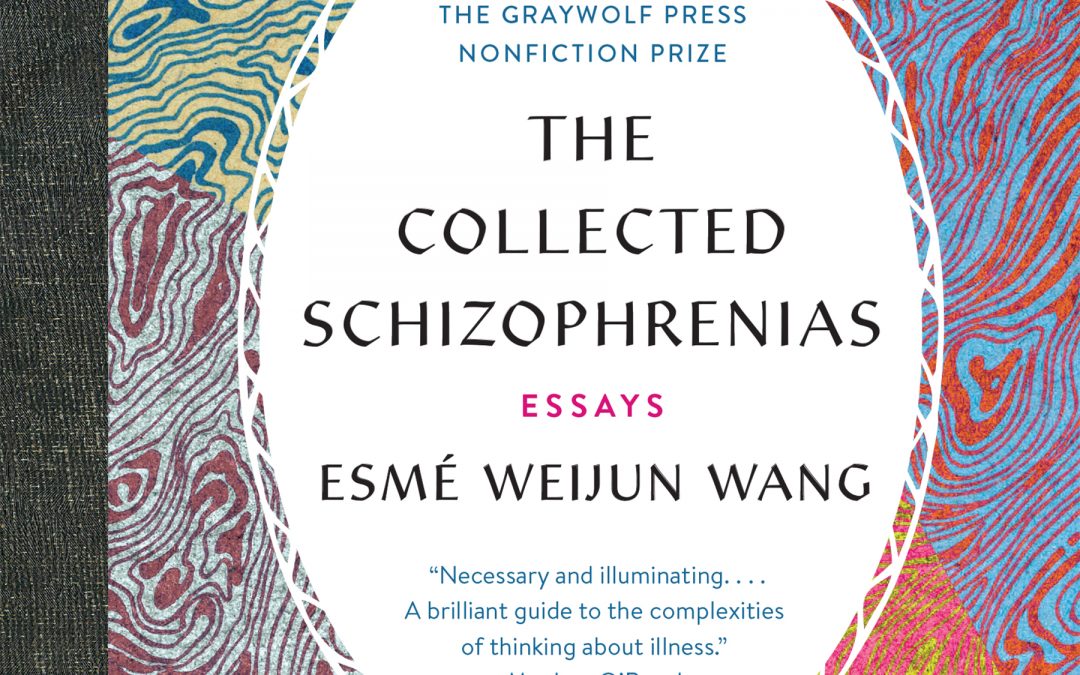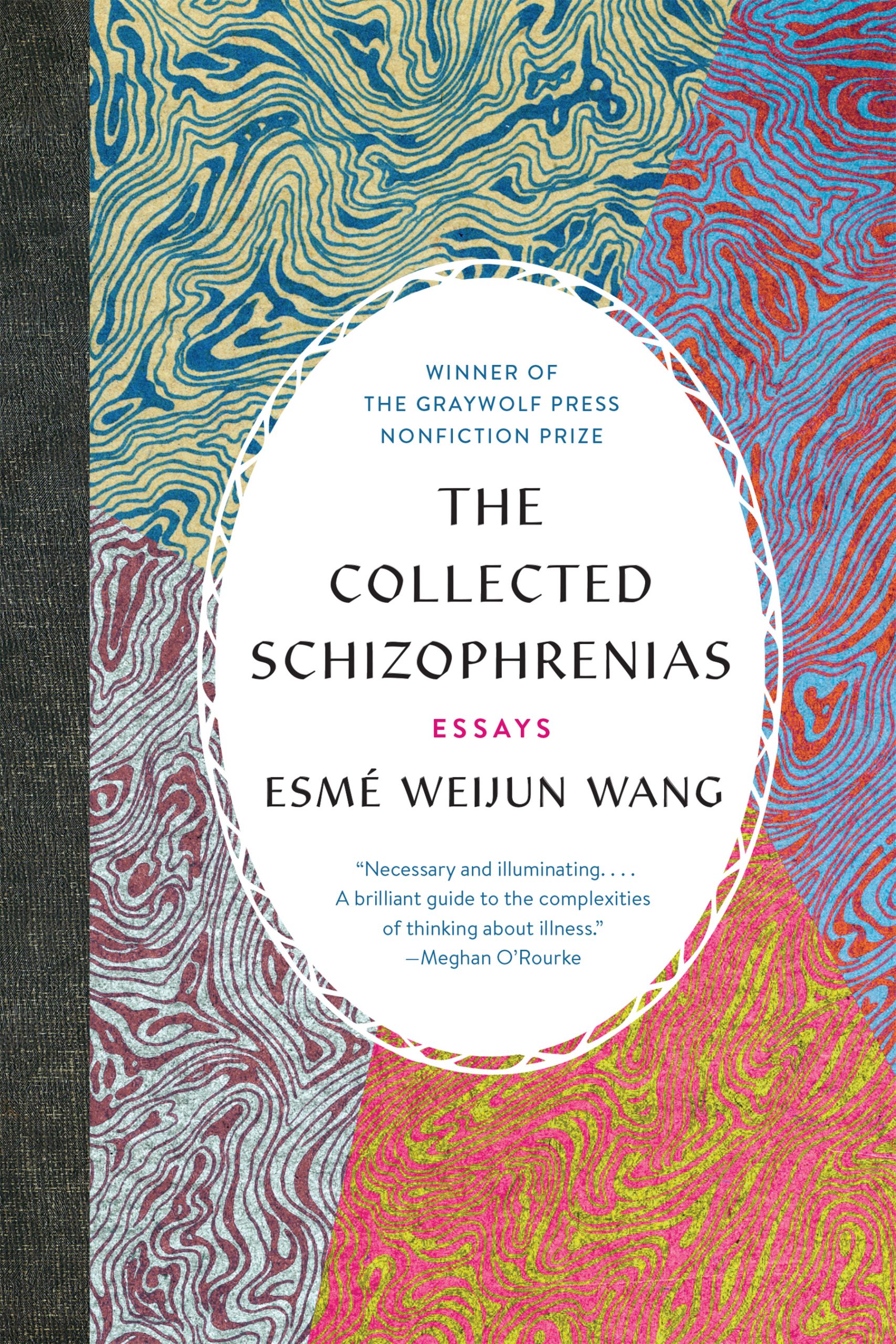Reviewed by ELIOT JOY
I bought my copy of The Collected Schizophrenias in spring of 2019 at a small, local bookshop with a flutter of hope in my chest. It’s rare to find literature authored by someone whose experience bleeds past the common boundaries of low or labile mood into less digestible territory. Too often, stories of psychosocial disability—commonly known through a framework of psychiatric disorder—are told from the outside looking in. We are objects discussed, our stories shared without consent. If we are to tell our stories, people want rock bottoms, dark with dirt and blood, or a soaring recovery narrative: the Hero’s Journey, writ in couch and pill and Kleenex. I was depressed, anxious, maybe abused. My life fell apart. I got help. It gets better.
Glowing blurbs and accolades promised that Esmé Weijun Wang’s collection of essays held something more for we who move through extreme states and unusual experiences, we whose perception of the world differs from others around us. We need books by us, for us. I thought that’s what I picked up to read. I thought, between writer and reader could be found a welcoming “we”.
I was disappointed. As it turns out, own voice is not enough.
Reading The Collected Schizophrenias felt like eavesdropping on a conversation between Wang and the privileged sane. The collection of essays appears to operate with the intention of challenging preconceived assumptions that plague those who receive any variety of schizophrenic diagnoses and educating an ill-informed reader as to what it means to live such a life. A worthy intention, given the long history of dehumanization and systemic abuse suffered by folks given these and related diagnoses, including those who take steps to avoid psychiatric intervention. However, Wang’s attempts to secure humanization are entrenched in a desire to meet the very sociocultural standards that define away our humanity. Her assertions of personhood too often hinged on her social performance, achievements, education, even her verbal coherence while in extreme states. As someone who has found themself so lost in language that their words no longer made sense to anyone, even themself, let me keep this short and simple:
This book hurt to read.
Critical disability theory defines disability as a sociocultural failure to meet the needs of diverse people. Colonial capitalist structures and expectations are social constructs, and as such, any inability to meet these arbitrary standards is due to culture, itself. We are disabled by the social organism, not our individual bodies. This understanding is foundational to disability advocacy and pride. Without it, discourse enters dangerous territory, blaming challenge, pain, and suffering on diagnosis, limit, and boundary. Wang falls into this category too often for comfort; too often, even, for safety.
The essay “High-Functioning” discusses a speech she gives as a member of an anti-stigma speaker’s bureau, identifying active attempts to classify her value:
“That phrase, “prestigious university,” was there to underscore my kempt hair, the silk [Mark Jacobs] dress, my [Chanel and Tom Ford] makeup, the dignified shoes. … “Prestigious university” acts as a signifier or worth.”
She goes on to describe other such signifiers—her wedding ring, her entrepreneurial pursuits—but dumbs down her language in what appears to be an attempt to make her speech more accessible and relatable. Later, addressing a group of clinicians, she reinvokes SAT words and not-so-humble-brags about her role as a researcher at the Stanford Department of Psychology’s Bipolar Disorder Clinic, where she: “briefly wondered if these clinicians would even be able to find work.” She ends the essay:
“A bespectacled woman raised her hand. She said that she was grateful for this reminder that her patients were human too. … When she said this, I was fingering the skirt of my exquisite dress. I’d fooled her, or convinced her. Either way, I knew, was a victory.”
A victory shared only by those capable of meeting exceptional standards. Wang’s résumé is an outlier regardless of her psychosocial disability. If we have to match that level of achievement in order to appear human in the minds of clinicians, only Wang and other Ivy League alumni have a chance at personhood—if they’re lucky. For most of us, if these are the standards of humanity, we’re doomed.
Wang wants nothing more than to place herself among the high-achieving sane and is more than willing to leave the rest of us in her dust. The parallels between the glorification of her own disabled exceptionalism and a “not like other girls” brand of internalized oppression are as striking as they are harmful. Wang wants the reader to know she’s not like other crazy people. Unlike those crazy people, she is smart and successful; she has worth. Never mind that her value is counted in units of measure built by the very systems that disable us in the first place.
This attitude is most obvious, even self-aware, in “High-Functioning”, but it can be found in more subtle ways throughout the entirety of the book. For example, in “Towards a Pathology of the Possessed”, Wang investigates a murder trial of Malcoum Tate, a man cared for by his family after receiving a diagnosis of schizophrenia. His mother waited in the car while his sister shot him, reloaded, and shot him again, killing her brother with thirteen rounds to the head and back. Wang uses her research of this tragedy in a blended essay, exploring cultural and situational fear of crazy people, a bill in California that would strengthen the reach of involuntary treatment of psychiatric patients, and two organizations that fought for or against the bill.
It seems Wang was attempting to show empathy for both sides of this argument and to point out a shared desire for improved access to community support for both individuals living with psychosocial disability and the families supporting them. For all the empathy she expresses for Tate’s murderers, she expressed little, if any, for Tate. She mentions his inability to speak for himself, which is certainly better than nothing, but it’s not the same thing as extending posthumous solidarity. Especially in the context of the humanizing quotes she extends to his murderers.
When Wang does offer space on the page to other people with psychosocial disability, they are usually people who have achievements and “signifiers of worth” much like her own. In “Towards a Pathology of the Possessed”, Julian Plumadore gets sizable quotes, describing his fight against the aforementioned bill in California and the power disparity between those fighting to increase the scope of involuntary practice and those fighting for their autonomy and humanity. I appreciate his story and the insights he shared about the racial and socioeconomic disparities between the two groups. It was hard not to notice, however, that she didn’t quote just anyone who fought against the bill, but a man with credentials: the manager of an anti-stigma speaker bureau and a former community advocate for another local organization.
In fact, there is a pattern in how she shares the page and gives platform to others with psychosocial disability. Those with “signifiers of worth” are treated as authority and equal, from Julian Plumadore of the speaker’s bureau, to Francesca Woodman, an accomplished young photographer who died of suicide, to Michelle Hammer, who runs Schizophrenic.NYC, an advocacy-focused clothing line. Those without “signifiers of worth” are treated by Wang much the way we are treated by sane people. They are given small vignettes, cautionary tales and examples of madness too far gone. She goes so far as to quote Jacques Lacan, who drew the line between the mysticism of John of the Cross and the madness of Daniel Schreber as such:
“…while John of the Cross wrote in a poetic way, Schreber did not.”
If certain aesthetics are required for us to maintain our personhood in the eyes of those in power, anything from taste to education to money will gatekeep our access to humanization. I can see how Wang might overlook the problem of aesthetics; after all, she, like many others, is empowered by fashion, a fact more uplifting than repeated reassurances that she has never experienced word salad. She can pass as sane when others cannot, and this passing protects her; even when she can’t pass, she is, at least, coherent. Rather than discuss her passing in terms of privilege or use her power to connect with those more marginalized than herself, Wang offers meager, handwringing self-reflections that do nothing to mitigate the damage of internalized ableism:
“Because I am capable of achievement, I find myself uncomfortable around those who are visibly psychotic and audibly disorganized. I’m uncomfortable because I don’t want to be lumped in with the screaming man on the bus, or the woman who claims that she’s the reincarnation of God. I’m uncomfortably uncomfortable because I know that these are my people in ways that those who have never experienced psychosis can’t understand, and to shun them is to shun a large part of myself.”
This fear of connecting with others like us also manifests itself in the erasure of our self-advocacy and organization. When I first read Wang’s essay “On the Ward” online, her glancing reference to “survivor-based movements” made her own voice narrative even more exciting. But again, I was disappointed. This is Wang’s only reference to psychiatric survivors and never does she specify what they survived. As a psychiatric survivor, this horrifies me. Nothing improved my quality of life like being connected to others who recognize the harmful, neglectful, and abusive practices suffered under the banner of psychiatry. Survivor communities save lives.
Not only does Wang fail to specify what she means by “survivor-based movements”, but her research reflects either a bias against or a woeful ignorance of such movements at large. In “Diagnosis”, an essay ripe with a variety of sources, she makes a sudden pivot from research into anecdote:
“Sometimes I encounter people who don’t believe in mental illness. These people may have been diagnosed with depression or anxiety at some point, but are usually symptom-free when I meet them. Often, they claim that such diagnoses are oppressive to those with unique abilities.”
If Wang cared to do her homework, she would find that survivor-based Mad Pride and Antipsychiatry movements have been spearheaded by people much like herself. People who have seen things and heard things others haven’t, who have suffered involuntary confinement and chemicals forced into their bodies, regardless of consent. A variety of cultures around the world view voice-hearing and other phenomenon through frameworks entirely other than the colonial strongarm of the American psychiatric paradigm, including frameworks of spirituality and connection to unseen forces. I can’t help but wonder how a book so lauded for its research overlooked these widespread, international movements, given her “prestigious” education.
The dearth of critical disability literacy in Wang’s book made it difficult to enjoy the true strength of her essays: the personal narrative. It’s a shame; Wang is a good writer. I enjoy her work when it doesn’t hurt. There are several I would recommend reading, despite some hesitation:
“On the Ward” and “Perdition Days” depict extreme states and unusual experiences in-scene, without straying into sensationalism or spectacle.
“John Doe, Psychosis” and “Chimayó” explore the intersection of psychosocial disability, trauma, and chronic illness.
“Beyond the Hedge” provides a grounded example of non-clinical community support and less-colonial perspectives and frameworks for unusual experiences, as well as avenues of study and tools others can use to improve their sense of personal agency.
I believe that Wang worked very hard on these essays, striving to inform and debunk as she felt best equipped. I also believe there is more to challenging stigma than intellectualism, aesthetics, and exceptionalism. The Collected Schizophrenias fails to lift up anyone other than those who meet or exceed standards set by the systemic structures producing the conditions that disable populations of psychosocial diversity in the first place. Wang’s collection alienates the audience it might have touched and caters to an audience wielding power over us.
If you are interested in learning more about critical disability theory, mad pride and mad studies, and psychiatric survivor movements, I offer you the following resources:
Hearing Voices Network – USA and UK
The Chemical Imbalance Theory: Dr. Pies Returns, Again
Mental Health, Madness, and Psychiatry: a study guide and annotated bibliography
Meet the blogger:
 ELIOT JOY lives between some rivers and near a few lakes. Forever Falling Sideways of the Icarus Project first published their poetry in 2013. Their love of writing has been fostered since they were six years old.
ELIOT JOY lives between some rivers and near a few lakes. Forever Falling Sideways of the Icarus Project first published their poetry in 2013. Their love of writing has been fostered since they were six years old.



